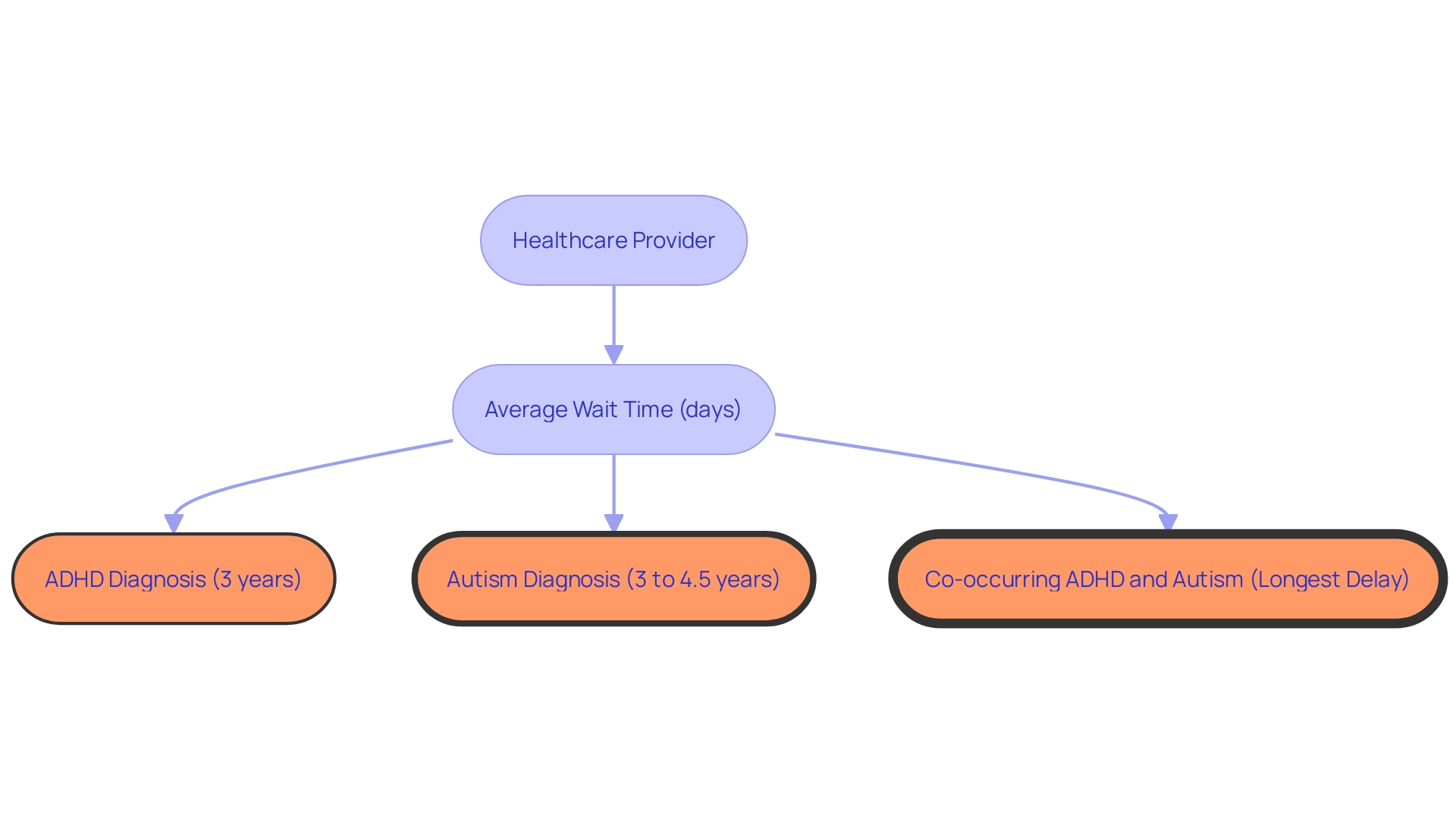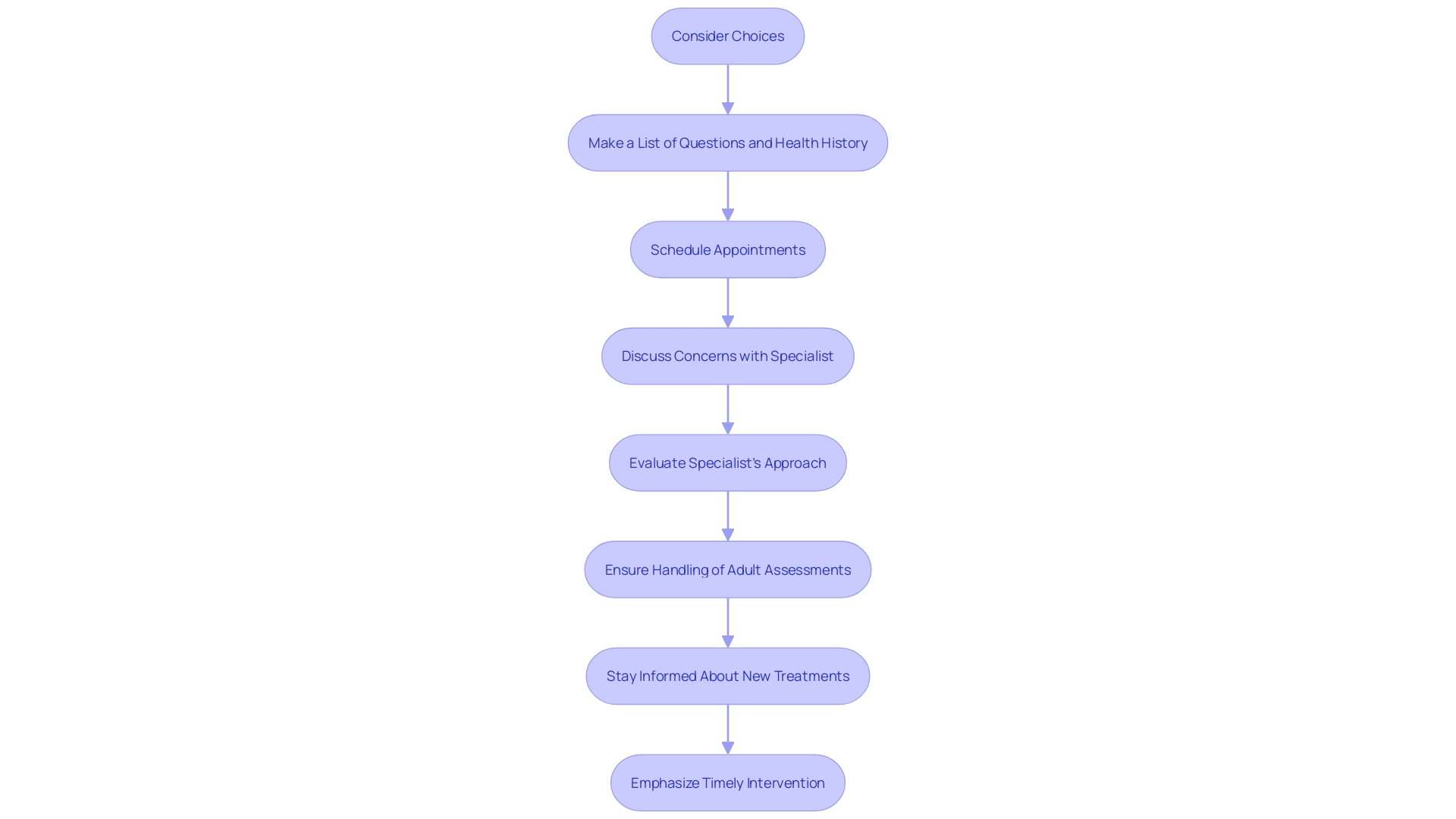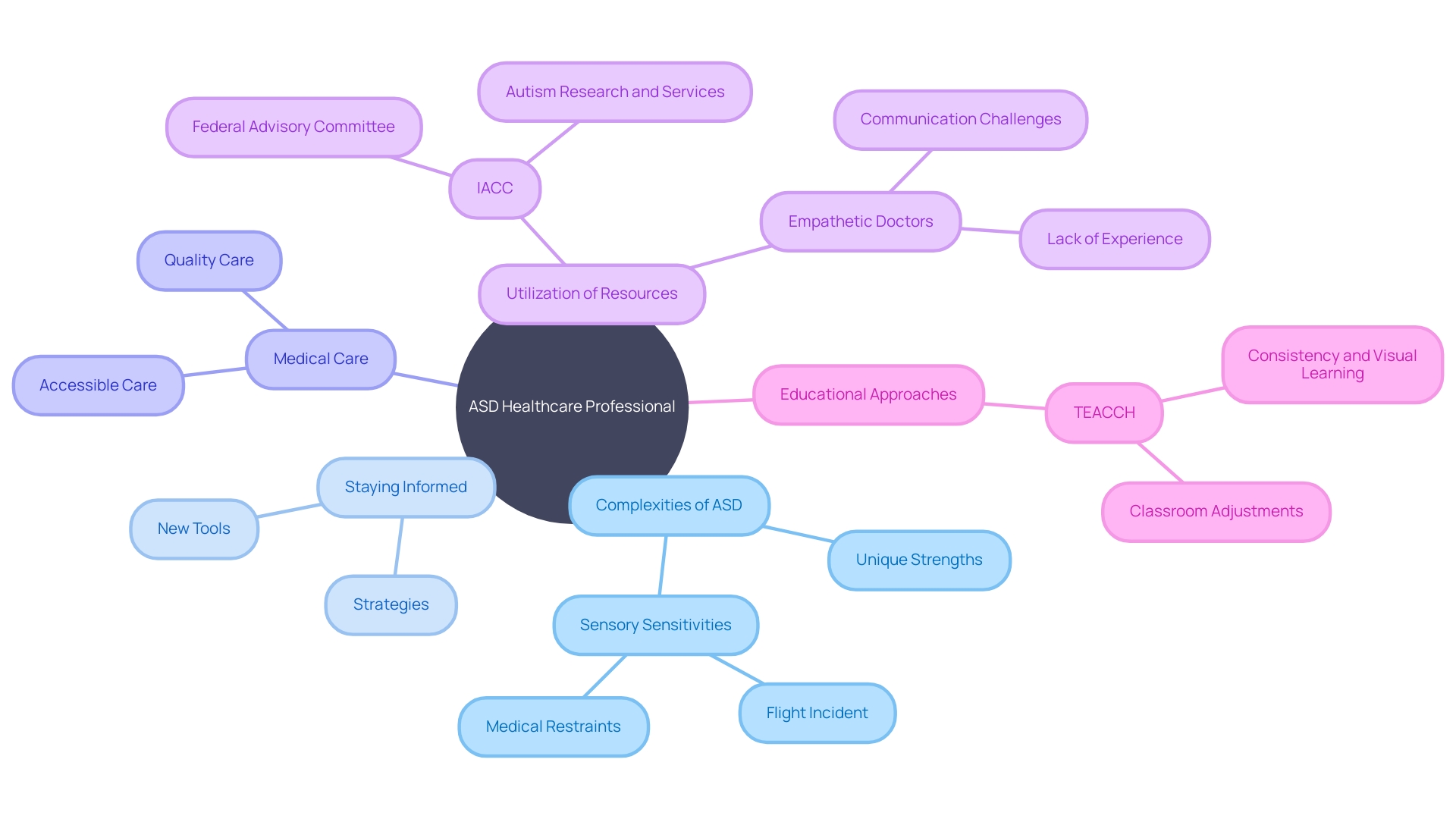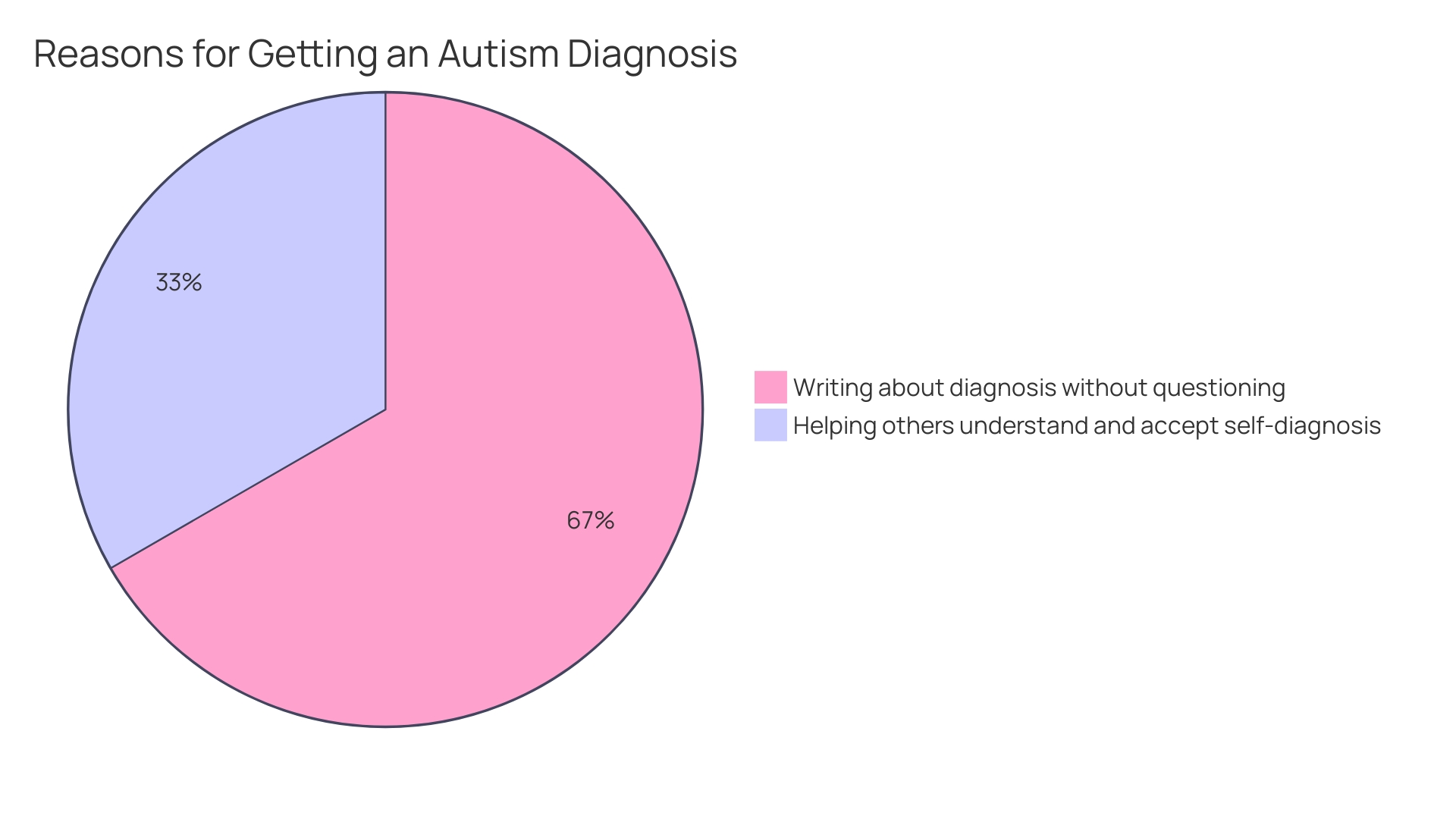Introduction
Selecting the right autism doctor is crucial for individuals on the autism spectrum and their loved ones. An adept doctor with expertise in autism can provide a precise diagnosis and comprehensive care, extending beyond diagnosis to ongoing support. Early identification is key, as autism affects individuals to varying extents and early interventions can support their unique needs.
However, the choice of an autism doctor is not to be taken lightly, as it impacts access to tailored resources and opportunities that foster a fulfilling life. In this article, we will explore the importance of finding the right autism doctor and provide tips for locating one near you. By staying informed and proactive, you can ensure that your journey to diagnosis and support is met with understanding and empowerment.
Let's dive in and discover how to navigate the complex landscape of autism care.
Why Finding the Right Autism Doctor is Crucial
Selecting an adept doctor with expertise in autism is pivotal for a precise diagnosis and comprehensive care. Such a doctor's role extends beyond diagnosis to encompass ongoing support for individuals with autism and their loved ones, which is instrumental in their journey. The importance of this choice cannot be overstated, as it impacts the individual's access to tailored resources and opportunities that foster a fulfilling life.
Autism, a spectrum condition, manifests through diverse behaviors and affects individuals to varying extents. Early identification is key, facilitating interventions that can support and affirm an individual's unique needs. Statistics highlight that autism may affect up to 1 in 36 individuals, underscoring the need for proficient healthcare providers versed in the nuances of autism.
An accurate diagnosis hinges on the criteria outlined in the DSM-5, which includes persistent differences in communication and social interactions, as well as restricted, repetitive patterns of behavior. Recognizing these signs and referring to specialists for evaluation are typically initiated by a primary physician. Misconceptions, such as the unfounded link between vaccines and autism, underscore the necessity of informed, evidence-based healthcare.
The transformative power of a timely autism diagnosis is exemplified by Heather Florio, who at 41, embraced her authentic self post-diagnosis. Her earlier years were marred by a sense of difference, miscommunication, and social challenges. This personal revelation emphasizes the profound impact that understanding and accepting an autism diagnosis can have on an individual's life.
Furthermore, the pursuit of knowledge regarding autism should be ongoing for caregivers, involving continual research on new treatments and medications. It is vital for caregivers to discern credible information, weigh the benefits and risks of interventions, and adapt to their child's evolving needs. Quotes from experts reiterate the significance of staying informed and consulting with specialists to navigate the vast array of data available.
In the context of employment, the challenges faced by autistic individuals are evident, with only 3 in 10 working-age autistic individuals employed, compared to higher rates among non-disabled peers. Efforts to enhance awareness, reduce stigma, and harness the productivity of autistic employees are crucial. Reviews and recommendations aim to improve the employment landscape for autistic individuals over the coming years, reflecting a broader societal commitment to inclusion and support.
In conclusion, the gravity of choosing an experienced and informed autism doctor cannot be overstated, as it lays the foundation for a supportive, understanding, and resource-rich environment that enables individuals on the autism spectrum to thrive.
Top 10 Tips for Finding Autism Doctors Near You
Navigating the journey to an adult autism diagnosis can be complex, but understanding the process and what to expect can make it more manageable. A comprehensive evaluation is the gold standard, involving an analysis of developmental history, cognitive and behavioral assessments, and self-report questionnaires. Yet, many adults receive inconclusive results, which can be frustrating.
For some, an official diagnosis validates their experiences and facilitates acceptance among peers and family. Others may find self-diagnosis sufficient for their support needs.
Staying informed about new autism research, therapies, and medications is crucial. Always evaluate the benefits and risks of treatments and consult with experts to filter out misleading information. When seeking a diagnosis or treatment, it's important to ask questions and be prepared to provide detailed information about your health and concerns.
A skilled professional can offer accurate diagnostic insights, often guiding individuals to appropriate therapeutic services without unnecessary delays.
Recent advancements by organizations like The Autism Community in Action (TACA) and NeuroQure highlight the importance of early and accurate autism diagnosis. These developments aim to provide timely support, which can significantly improve outcomes. Remember, each journey to understanding and managing autism is unique, and finding the right support starts with accessing reliable information and expert care.

Research Local Medical Facilities
When seeking a diagnosis for autism as an adult, it's important to consider various pathways and resources. Clinics and medical facilities with a focus on autism can provide valuable support, but it's worth noting that the autistic and neurodivergent community is accepting of self-diagnosis, especially given the challenges and potential inconclusive results from medical testing. However, an official diagnosis can be instrumental for some individuals in accessing tailored support and services.
Facilities like the Ron and Rose Bowen Family Autism Campus, with its comprehensive approach to autism care, are prime examples of supportive environments that cater not just to the individual, but to their families as well. They offer a holistic approach, with spaces for everything from therapy to marriage counseling, acknowledging the multifaceted nature of care required.
For those opting for an evaluation, it's important to find healthcare providers who adopt a partnership approach, such as Dr. Maria, a Family Nurse Practitioner specializing in integrative methods. Providers like her emphasize collaborating with patients to achieve optimal health outcomes. Furthermore, the prevalence of autism, estimated by the CDC to affect 1 in 36 individuals, underscores the importance of accessible and informed healthcare services.
Such services should not only focus on diagnosis but also on the continuous care and support for the adult autistic population, as emphasized by Harvard Medical School's initiative for Adult Autism Health Resources. This initiative serves as a reminder of the need for quality healthcare services for autistic adults, comparable to those available to neurotypical individuals.
Check Credentials and Specializations
Seeking out a specialist in adult autism diagnosis requires a thoughtful approach. Identifying a healthcare provider, such as Dr. Maria or Dr. Wang at the Bio Energy Medical Center, who not only has the credentials but also embraces a patient-centered philosophy can make all the difference. Both practitioners bring a depth of experience and a holistic approach to their specialties, with Dr. Maria focusing on integrative methods and Dr. Wang being an acclaimed acupuncturist with a long family history in medicine.
It's crucial to choose a specialist who has a significant background in the area of autism spectrum disorders (ASD), given its complex nature as a spectrum condition that presents in various ways. The Centers for Disease Control and Prevention (CDC) estimate that autism occurs in as many as 1 in 36 individuals. Therefore, professionals who are well-versed in the latest research and diagnostic criteria, such as the DSM-5, are indispensable.
For instance, the recent updates to the ABA Practice Guidelines for the Treatment of Autism Spectrum Disorder reflect the dynamic nature of the field and underscore the importance of selecting a specialist who is informed by the most current standards of care.
When examining prospective doctors, it's recommended to focus on those who are board-certified in areas relevant to ASD and are actively engaged in research or practice within the field. As of 2023, the American Board of Professional Psychology (ABPP) reports that 4,400 licensed psychologists in the United States hold ABPP board certification, with specializations that include clinical neuropsychology and clinical child and adolescent psychology.
Moreover, the sentiments shared by experts in the healthcare industry echo the sentiment that the relationship with a specialist should feel like a partnership, where the patient's voice is paramount. They suggest seeking specialists who are part of established medical centers, ensuring they are not only in-network with your insurance but also have substantial experience with your specific health concerns. This level of attentiveness and respect for patients' perspectives is a critical component of quality care for those seeking an autism diagnosis.
Read Reviews and Ask for Referrals
Exploring the journey to find a suitable autism specialist for your family can be akin to assembling a unique puzzle where each piece must fit just right. Navigating through the myriad of medical options requires a blend of insightful research and community insights. A highly recommended approach involves immersing oneself in discussions with local support groups and tapping into the collective wisdom of online forums, where personal experiences and recommendations are freely shared.
Similarly, consulting with educational institutions, such as your child's school, can yield valuable referrals, as they often have connections with reputable professionals in the field of autism care.
Weaving through the tapestry of options, it's crucial to remember that the essence of a good doctor-patient relationship transcends the confines of a medical degree or the walls of a clinic. As Dr. Anthony Orsini, a luminary in doctor-patient communication, highlights, the bond of trust and the feeling of being valued as an individual reign supreme. This resonates deeply with the sentiments of caregivers who are in search of not just a healthcare provider, but a partner in the holistic well-being of their loved ones.
In this dynamic landscape of autism care, where treatments and interventions are continually evolving, staying informed is indispensable. Caregivers bear the responsibility of discerning the merits and drawbacks of various treatments, medications, and therapies. The goal is to ensure that any path taken aligns with the unique needs and identity of the individual with autism, all the while remaining vigilant against the allure of unverified online treatments that may do more harm than good.
Finding the right autism doctor is indeed a profound step, but the journey doesn't end there. It's an ongoing process of collaboration, learning, and adapting, where the ultimate goal is to enhance the quality of life for those on the autism spectrum and their families.
Evaluate Insurance and Payment Options
When embarking on the journey to find an autism specialist, it's essential to consider not just the expertise of the doctor but also the practicalities of insurance and payments. By verifying that the doctor is within your insurance network, you can avoid unexpected costs and take full advantage of your benefits. It's important to have a clear understanding of any potential out-of-pocket expenses and the specifics of the reimbursement process.
This careful financial planning can ensure that your path to diagnosis and support is as smooth and stress-free as possible. Keep in mind that the value of an official diagnosis can vary for each individual, and for some, the community's acceptance of self-diagnosis may suffice. However, if an official diagnosis is important to you, for personal validation or to facilitate understanding from others, then these preparatory steps are a crucial part of your journey.
Consider the Doctor's Experience with Autism
While pursuing an adult autism diagnosis, one must weigh the importance of a professional evaluation against personal circumstances. The autistic community largely accepts self-identification due to the limitations of medical testing, which often yields inconclusive results. However, an official diagnosis can be crucial for those who require validation in certain social or legal contexts, or for individuals seeking a formal acknowledgment of their condition.
Choosing a healthcare provider with a deep understanding of autism is vital. It's not just about their tenure in the field but also their approach to care, which should ideally align with the neurodiversity movement's values, recognizing autism as a natural brain variation and not something that necessitates a cure. Such a perspective fosters a supportive environment rather than one fixated on 'fixing' the individual.
The experiences of autistic individuals in medical settings underscore the necessity for clinicians who are not only knowledgeable but also compassionate and accommodating. Inadequate expertise among healthcare professionals can lead to detrimental outcomes, such as misdiagnosis or inappropriate treatment. The goal should be to reduce processing demands and adapt interactions to improve engagement with autistic adults.
Recent studies have revealed that the lack of autism understanding among healthcare providers, coupled with communication and sensory challenges faced by autistic adults, calls for enhanced training and system adaptations. This training should be developed collaboratively with autistic adults to ensure it meets their unique needs.
Therefore, when seeking a diagnosis or treatment for autism, it is essential to inquire about a clinician's experience with autism cases, their educational background, and their treatment philosophy. This could include their years of service in the field, research contributions, and recognitions received for their practice, all of which may contribute to a more tailored and effective healthcare experience for individuals on the spectrum.
Look for Doctors with a Patient-Centered Approach
The journey to an accurate autism diagnosis is not merely a clinical checklist; it's a path paved with understanding, empathy, and a commitment to individualized care. Seeking professionals who embrace a patient-centered philosophy is critical. These professionals will not only rely on established diagnostic criteria but will also value your unique concerns, actively involve you in the decision-making process, and tailor their approach to your personal goals.
This echoes the thoughts of Dr. David (Dan) R. Offord, who emphasized a fair and supportive environment for all children, including those with autism.
The urgency to address the healthcare needs of autistic adults is gaining recognition, as highlighted by Dr. Christopher McDougle at Harvard Medical School. The Adult Autism Health Resources initiative spotlights the necessity for quality medical care for autistic adults, akin to their neurotypical counterparts. Similarly, the message from The Autism Community in Action is clear: autism is treatable, and early, accurate diagnosis is the gateway to effective intervention.
In addition, the current dialogue in research, initiated by figures like Abbeduto and Kover, is shifting towards a more nuanced understanding of autism that transcends narrow diagnostic labels. It calls for greater attention to individual identities and the push for practices rooted in equity. This perspective is supported by the IACC, which underscores the importance of diverse insights and collaboration in enhancing autism research and services.
Moreover, embracing Health Technology Assessment (HTA) in healthcare delivery can ensure that interventions for autism are evaluated holistically, considering factors such as cost, safety, and efficacy. This approach is instrumental in shaping patient-centered treatment strategies.
Statistics affirm the significance of recognizing the assets and addressing the unmet needs of children with disabilities, which is essential for their mental health and equitable integration into society. As we move forward, it's imperative to center the voices and experiences of autistic individuals and their families, ensuring that each step towards diagnosis and treatment is taken with the utmost respect for their individual journey.
Check Availability and Wait Times
When choosing a healthcare provider for an autism diagnosis, it's essential to consider the associated wait times, which can vary significantly. A Merritt Hawkins survey found that new patients could wait an average of 26 days for an appointment, and this timeframe has been increasing. This delay can be even more pronounced for autism assessments.
A Senate inquiry report has shown that individuals seeking an autism diagnosis can face waits ranging from three to four-and-a-half years. Moreover, gender disparities exist, with females, particularly those with co-occurring ADHD and autism, experiencing longer waits than males. The impact of such delays is profound, as the Child of the North report indicates that autistic children waiting for an assessment are less likely to thrive in mainstream education and are at risk of exclusion from school.
To navigate these challenges, one strategy is to join a waiting list for potential last-minute cancellations and remain flexible with your scheduling. As recommended by experts, it's also prudent to vet potential clinicians thoroughly, checking their expertise in autism and responsiveness to follow-up questions. With the rise of autism referrals and long-standing wait lists, it's crucial to proactively manage the appointment process to expedite the path toward diagnosis and support.

Assess the Quality of Care and Facilities
When selecting a medical professional or facility for autism diagnosis and care, it's imperative to consider the quality of service they provide. A welcoming atmosphere, a clean environment, and a staff that exudes warmth and professionalism are fundamental. Beyond aesthetics and demeanor, look for a comprehensive approach that includes up-to-date and patient-centered diagnostic and treatment methods.
Dr. Anthony Orsini emphasizes the importance of a trusting relationship between patients and doctors, stating, "Patients need to feel seen and heard, and they need to know they're more than just a number." The increasing prevalence of autism, now estimated to affect 1 in 36 children, has led to a surge in the number of service providers. However, with this growth comes a variety of care standards.
Some facilities have been influenced by private-equity firms, with research indicating that patient care may suffer in such environments. The Care Quality Commission (CQC) in England provides a helpful model, offering inspection reports and a 4-point rating scale to help gauge the quality of health and social care services. In today’s healthcare landscape, where clinicians are often burdened by administrative tasks, finding a provider who invests time and genuine care in their interactions with you is crucial.
This is underscored by recent shifts in autism research methodologies, moving from quasi-experimental studies to more rigorous randomized-controlled trials, reflecting the importance of evidence-based care. As you navigate the complex terrain of autism services, remember that the right fit is not just about credentials, but also about the quality of the human connection and the ability to provide support tailored to individual needs.
Evaluate Communication Styles
An autism diagnosis in adulthood can be a transformative experience, shedding light on questions that may have lingered for years. It's an intricate journey that begins with the pivotal step of finding the right specialist. Clear, attentive communication between doctor and patient is vital.
The value of such effective communication cannot be overstated—it's the bridge that connects a patient's experiences with the medical insight necessary for an accurate diagnosis. The initial consultation is your chance to gauge this critical element. Observe if the doctor is fully present, patient, and open to your inquiries.
Do they provide a space where your lived experiences resonate? This attentiveness is a hallmark of care you can trust.
In the context of healthcare, where technology often mediates our interactions, the human connection becomes even more precious. The nuances of face-to-face dialogue—a nod, a reassuring tone—carry immense weight, particularly for those on the autism spectrum. It's in these subtleties that trust is built, and a patient's narrative is truly heard.
Autistic adults seeking diagnosis need to feel heard and understood, and this is a sentiment echoed by the wider medical community and patient advocacy groups alike.
Statistics underscore the importance of this journey, revealing that 1 in 45 adults in the U.S. are diagnosed with autism spectrum disorder (ASD). Yet, this figure likely represents just the tip of the iceberg, with many adults undiagnosed or misdiagnosed. The lived experiences of these individuals, as well as the professional insights of those within the medical field, emphasize the profound impact that recognizing and addressing ASD can have on one's life.
This is not merely about appointments and assessments; it's about recognizing the diverse tapestry of adult autism and ensuring that the nuances of each individual's story inform their path to diagnosis. The words of Dennis Kimbro, "Life is 10% what happens to us and 90% how we react to it," resonate deeply here. For many, the process of seeking an autism diagnosis is part of a larger personal journey that reshapes perceptions and opens new avenues for growth and contribution.
As the landscape of autism diagnosis evolves, with organizations like The Autism Community in Action (TACA) and innovative biotech firms like NeuroQure spearheading the development of early diagnostic tools, the conversation around adult autism is gaining momentum. The stories of those who have navigated this path before, coupled with the ongoing research and advocacy efforts, serve as a testament to the power of understanding and addressing autism in adulthood.
Schedule a Consultation
After you've carefully considered your choices, it's time to set up consultations with potential autism specialists. These meetings are vital to not only discuss your concerns but to truly gauge whether their approach aligns with your needs. Remember, a thorough evaluation of an adult for autism is multifaceted.
It involves reviewing developmental history, understanding thought processes, and considering behaviors. Most importantly, it's about finding a professional capable of handling the intricacies of adult assessments, as many struggle to get clear results from testing. With recent endeavors like NeuroQure's mission to offer early diagnostic tools, it's a reminder of the importance of timely intervention.
When preparing for your visit, make detailed lists of health history and any questions you have. The aim is to stay informed and proactive, understanding that new treatments and findings are constantly emerging. This preparation ensures that you are equipped to discuss potential treatments and their risks with the specialist.
An informed dialogue with a healthcare provider, who is not only skilled but also empathetic to your journey, can significantly impact the diagnostic process and subsequent care.

Additional Resources for Finding Autism Doctors
Embarking on the journey to find the right healthcare professional for autism spectrum disorder (ASD) is crucial, as ASD is a complex neurological and developmental condition that manifests uniquely across individuals. It's not just about locating a doctor but finding one who understands that autism is an intrinsic part of a person's identity, offering a distinct perspective on the world. Adults with ASD often exhibit diverse talents, such as heightened focus, meticulous attention to detail, and exceptional problem-solving abilities, which are assets in fields like technology.
Given the lengthy wait times for new patient appointments, which average 26 days, and the increasing number of doctors retiring from the workforce, it's essential to have efficient strategies for connecting with the right medical professionals. Maintaining a comprehensive and regularly updated list of specialized physicians can significantly streamline this process. Utilizing such a list, which includes detailed information like contact details and areas of expertise, can reduce the effort and time spent on the search.
Moreover, recent advancements in technology, including artificial intelligence, show promise in aiding early diagnosis, which can facilitate timely access to supportive services. It's a constantly evolving landscape, and staying informed about new tools and strategies for autism care is vital. For example, efforts are being made to integrate early autism screening into routine healthcare practices to ensure that individuals can receive the necessary support as early as possible.
The importance of accessible and quality medical care for autistic adults cannot be overstated, as highlighted by experts from Harvard Medical School and the Adult Autism Health Resources initiative. It's not just about the present; it's about acknowledging the needs of the existing population of autistic adults and ensuring they can lead fulfilling lives.
In summary, finding the right autism doctor involves much more than a simple search. It's about understanding the complexities of ASD, recognizing the unique strengths of autistic individuals, and utilizing the right resources to connect with medical professionals who can provide empathetic and informed care.

Final Tips and Next Steps
Identifying the right healthcare professional for autism spectrum diagnosis in adults is a nuanced process. It's important to note that while self-diagnosis is accepted within the autistic and neurodivergent community due to the complexities and potential inconclusiveness of medical testing, there are valid reasons to pursue a formal diagnosis. These include the desire for official recognition, which can aid in writing and discussing one's experiences without doubt from others, or to help those close to you understand and accept your situation.
Additionally, recent developments underscore the importance of early and accurate diagnosis in improving outcomes. For instance, organizations like The Autism Community in Action (TACA) highlight the benefits of early intervention. In line with this, NeuroQure has made strides in developing diagnostic tools that could significantly reduce the time to diagnose ASD, from years to potentially weeks after birth, particularly benefiting families with a higher risk due to previously affected children.
Moreover, understanding and staying informed about the latest treatments, medications, and therapeutic approaches is critical. As shared by caregivers, it's vital to assess the benefits and risks of medications and therapies, ensuring that any information gathered is cross-verified with experts.
Statistics reveal that while a significant number of autistic individuals wish to work, only a small fraction are employed compared to non-disabled people, and they also face the largest pay gap among disability groups. This highlights the need for initiatives to raise awareness, reduce stigma, and leverage the productivity of autistic employees. Efforts are ongoing to improve employment rates for the autistic population, with reviews seeking input from employers, charities, and support groups to break down barriers and create supportive work environments.
When searching for a healthcare provider for autism diagnosis, one can look to databases that offer comprehensive lists of doctors, with customizable fields such as specialty and location. These lists, which include detailed contact information, can simplify the search process and are often updated to ensure accuracy and high deliverability of communications.

Conclusion
Selecting the right autism doctor is crucial for individuals on the autism spectrum and their loved ones. Early identification and interventions are key in supporting their unique needs. It's important to understand the complexities of autism and utilize the right resources to connect with medical professionals who can provide precise diagnosis and comprehensive care.
When seeking a diagnosis for autism as an adult, consider various pathways and resources. Clinics and medical facilities with a focus on autism can offer valuable support, while self-diagnosis may be accepted within the autistic and neurodivergent community. However, an official diagnosis can provide access to tailored support and services.
Choosing a specialist in adult autism diagnosis requires careful consideration. Look for healthcare providers with credentials and a patient-centered philosophy. Their expertise in autism spectrum disorders (ASD) is crucial, as they navigate the complex nature of the condition and stay informed about the latest research and diagnostic criteria.
Effective communication between doctor and patient is vital in the journey to an accurate autism diagnosis. It builds trust and ensures that a patient's experiences are understood and considered. Proactively managing the appointment process can help expedite the path toward diagnosis and support.
In conclusion, finding the right autism doctor involves understanding the complexities of ASD, recognizing strengths, and connecting with informed and empathetic medical professionals. It's an ongoing process of collaboration, learning, and adaptation to enhance the quality of life for individuals on the autism spectrum and their families.




